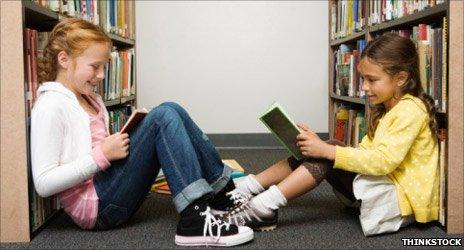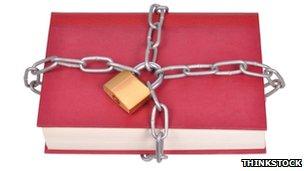Why are parents banning school books?
- Published

In the US more and more parents are pressing schools to withdraw books with bad language or sexual content. But should children's books be restricted in this way?
There is a battle being fought in America over books.
The skirmishes see concerned parents "challenge" books which are being used in schools.
Other parents are fighting for the right of their children to go into their school library and pick up those very same books.
The issue is being highlighted by the American Library Association during its Banned Books Week.
The ALA recorded 460 attempts in 2009 to have a book withdrawn from a library or classroom.
Part of the problem lies in the rise of young adult fiction. Nearly 60 years after the publication of The Catcher in the Rye, teenager readers are now a lucrative market around the world.
The Twilight series has brought author Stephanie Meyer millions, but she has also found her work in the top 10 most challenged, with parents objecting to sexual explicitness and unsuitability for younger readers.
More surprising to many people would be the three established literary classics on the list. The 10 most challenged include The Catcher in the Rye, The Color Purple and even To Kill A Mockingbird.
"I was shocked that anybody would find this book offensive," says Barbara Jones, director of the office for intellectual freedom at the ALA.
Harper Lee's book has been challenged by black parents who object to the use of the word "nigger". It appears 58 times in the book, notes Ms Jones.
But for most challenged books, the issue is usually sex or sexuality.
Lauren Myracle has endured a stream of angry e-mails from parents who are outraged by her bestselling series about a group of teenage girls. They are all written in the style of instant messaging, and the three books are called ttyl, ttfn and l8r, g8r.
"It is so revealing to me the vituperativeness they address me with. They are angry," she says.
A typical e-mail reads: "What gives you the right to take away my child's innocence?"
"I've got one teenager who has got a potty mouth," says Myracle. "These are high school girls, one is trying to decide whether to have sex with her boyfriend."
Many of the challenges recorded by the ALA are aimed at high-schools, restricting the reading material of children aged 14-18.
But even books for younger readers, like Myracle's work Twelve, can generate floods of complaints. The book describes a girl figuring out how to put in a tampon, which prompted angry e-mails.

Myracle argues that to engage with teenagers you need to write honestly about them.
"Kids need to see their world reflected back to them. I've had many girls say thank you for writing this."
There's a disparity between the US and UK. While in the US, formal challenges to books in school libraries are routine, they are very unusual in the UK.
Part of the difference is in the level of local control over schools. Typically in the US, locally-elected school boards can have books withdrawn when parents petition them.
In the UK, control lies almost exclusively in the hands of headteachers, says Sally Duncan, of the School Library Association. She can recall one primary school that refused to have any Harry Potter books because of the supernatural content, but such moves are rare.
"Parents are perhaps less likely to complain about the content of books in the UK as, by and large, we are a less 'religious' society," says Ms Duncan.
Across the Atlantic, one struggle has been played out in the small town of Stockton, Missouri, over Sherman Alexie's book The Absolutely True Diary of a Part-Time Indian.
The work has won a National Book Award, but the story of a 14-year-old Native American on a poverty-stricken reservation, touched by tragedy, upset many parents in Stockton after they learned it was being used in lessons in the school.
The opposition to the book was led by lawyer and parent Mike Holzknecht.
"The book is just chock full of vulgarity, profanity, obscenity and sexual explicitness involving minors," he says. "People around here, where it's pretty rural and conservative, they will go a long way, but this book was so far over the edge. It doesn't belong in a school."
After a number of meetings spread over several months, the book's opponents succeeded. The school board voted to withdraw the book from the school curriculum and the school library.
Cheryl Marcum was among those who were defending the book.
"It was one of the best books I've ever read in my life. The themes are pervasive poverty, alcoholism, bullying, racism and absolutely no hope. All of that applies to Cedar County [where Stockton is].
"We believe parents have every right and responsibility to monitor what their children read. But they don't have the right to prevent other children from reading books, particularly national award-winning books."
Mr Holzknecht accepts the book is a "nice story" but can't accept the language or the sexual explicitness. He moved his family to Stockton because he felt it was a place with good, shared values.
"This is a community with the type of values that are consistent with the way we like to raise our children." Why are parents banning school books?
The fundamental split is between those who think teachers should be able to challenge and engage children with edgy books, and those who think only the parents should be allowed to do that.
"We are overprotecting our children," suggests Ms Jones. "They have heard this language. They have probably said it themselves. It isn't dangerous for children to be able to confront unpleasant ideas. What better place to engage with ideas than in a school or in a library?"
And of course the net result of a battle over a book, like Stockton's, is that more children end up reading the suddenly controversial work and the author sells more books. Even Mr Holzknecht has to admit he's purchased three copies.
"These boards are fooling themselves that if they ban the book the kids aren't going to get hold of them," says Ms Jones.
To kids, contraband is cool.